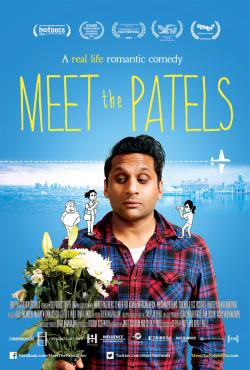Meet the Patels

There’s a subplot in Learning to Drive about one character’s arranged marriage. His explanation, while broad-minded and considerate and all, still comes off as superficial. It’s enough to satisfy the bobos as they pat themselves on the back for being so cosmopolitan, watching a movie — a classy one, mind you, not a mainstream Hollywood flick — where one of their kind rubs elbows with a Sikh driving instructor. What more can you expect from a graduate of Rosemary Hall?
But what if there was a movie that actually let real Indian-Americans explain arranged marriage, how it works today, and how they feel about it? Well, meet the Patels. No, seriously, Meet the Patels: a “documentary romantic comedy” made by Geeta Patel (Project Kashmir) and her brother, Ravi.
Geeta and Ravi are first generation immigrants; their parents (Vasant and Champa) were born in Gujarat, but both children were born in Illinois and retain just a hint of a post-colonial accent. But that’s not to say that they’re untouched by their family heritage. Ravi, at the start of filming, is about to turn thirty and he’s still not married. To most of the extended family, it’s getting kind of weird. As far as they’re concerned, he should be fixed up with someone. And not just anyone; he needs to marry a Patel.
As the film explains, “Patel” is not just a family name. It was a caste of landowners and village leaders, mostly from Gujarat but also from some of the neighboring states. It’s sort of like the way anyone named “Cohen” is ultimately descended from the Kohanim, who were priests in the Temple of Jerusalem. But in the Patels’ case they form a global family. Just sharing the surname is enough to create an instant bond, and people traditionally marry within different branches of the Patels. Ravi’s uncle explains some of these branches, mostly about which villages they ultimately came from, and how there are certain Patels he should consider marrying and certain he shouldn’t.
But Ravi is also as much an American as I am. Being raised here, he wants a long dating period to get to know someone before he marries her. At the same time, dating was discouraged in his family. He’s only had one real romantic partner in his life, which he didn’t tell his parents about — a redhead from Connecticut was probably not going to satisfy them — and he broke up with her just before filming started.
See, Ravi wants something like the Western model of dating and romance, but he also wants to maintain his connection to his Indian heritage, so he wants to find an Indian woman who shares that. It’s the sort of thing the word “ambivalent” was invented for: Ravi feels pulled strongly in two directions. Caught in the middle, he has to figure out how to navigate both of these spaces at once. And so he decides to try it his parents’ way.
But Ravi’s not alone in the middle. There are millions of Indian Americans, and lots of them are young adults in the same position. And since in America there aren’t thousands of eligible Patels just in the next district, the whole process has had to adapt. Families compile and trade “biodata” — basically, dating résumés — and trade them far and wide, passing on ones that they think might make good matches, and holding back ones they deem unsuitable. There are even marriage conferences, where all the North American Patels on the market get together in an orgy of icebreakers and speed dating. Ravi spends half of the film using these networks to find prospective brides, going on dates with the ones who seem promising, and the other half wondering if this is really what he wants at all.
Warm and funny, Meet the Patels is unique in how it refuses to play as either condemnation or apologetic. Arranged marriage isn’t a strange, backwards, third-world custom, and it’s not an enlightened, more sensible way to do things either. Young people like Ravi and Geeta are in the middle of two strong traditions, and it’s generous of them to invite us to watch along as they figure out what it is they really want.
Worth It: yes.
Bechdel-Wallace Test: pass.
This review also appears at Punch Drunk Critics.

Trackbacks